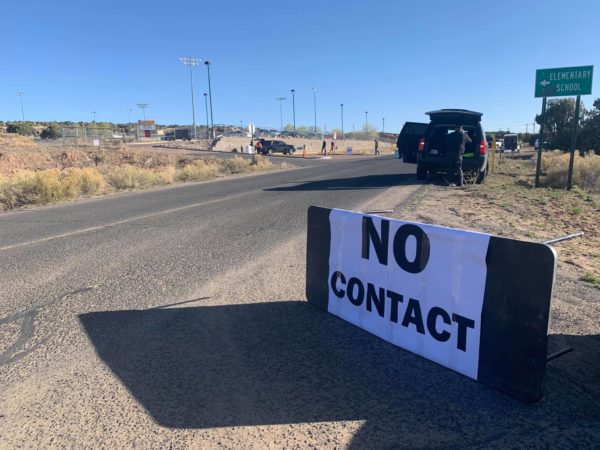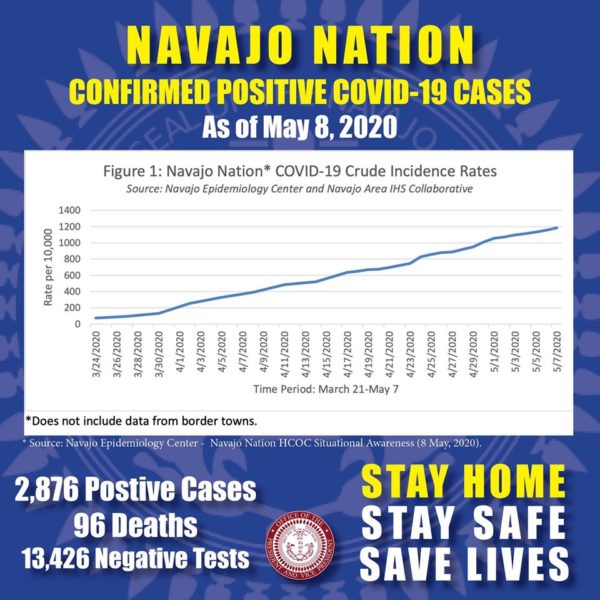
- Details
- By Levi Rickert
WINDOW ROCK, Ariz. — Deaths from the COVID-19 (coronavirus) is nearing 100 on the Navajo Nation. On Friday night, the Navajo Department of Health in coordination with the Navajo Epidemiology Center and the Navajo Area Indian Health Service, reported eight more deaths from the virus on Friday night as the death toll now stands at 96.
There were 119 new cases of COVID-19 for the Navajo Nation reported, which brought the total of positive COVID-19 cases to 2,876 since reporting started on March 17, 2020. A total of 17,858 COVID-19 tests have been administered with 13,426 negative test results.
Once again, there is a 57-hour curfew in effect as the Navajo Nation yet fights to stop the further spread of the coronavirus.

The 2,876 confirmed positive cases on the Navajo Nation include the following counties:
- McKinley County, NM: 787
- Apache County, AZ: 739
- Navajo County, AZ: 609
- Coconino County, AZ: 314
- San Juan County, NM: 295
- San Juan County, UT: 49
- Socorro County, NM: 26
- Cibola County, NM: 33
- Bernalillo County: 3
- Sandoval County, NM: 21
On Friday, Navajo Nation President Jonathan Nez, Executive Branch employees, chapter officials, and Community Health Representatives distributed food, water, and much-needed supplies to families in the remote communities of Hard Rock, Forest Lake, and Black Mesa. By providing families with essential items, they are able to remain home rather than having to go into public to purchase items.
“The only way we’re going to get through the COVID-19 pandemic is by unifying our efforts and working together and that’s what we’re doing when we collaborate with chapters and others to get food, water, and other supplies to families. Today, we saw a lot of elders that live in rural areas and we were able to give them the supplies they need to stay home and stay safe so that they don’t have to go into public and put themselves at risk of the virus. During this weekend’s curfew, we ask everyone to abide by the curfew and stay home!,” said President Nez.
“With Mother’s Day weekend upon us, let’s use this time to pray for all mothers, grandmothers, and caretakers who have given so much of themselves for their children and others. In our families, the mothers and grandmothers are the foundation and the source of strength for us throughout our lives. We wish all of you a Happy Mother’s Day. Please be safe,” President Nez added.
Since the Nez-Lizer administration began the distribution events two weeks ago, approximately 4,500 families have received food, water, firewood, protective masks, sanitizer and cleaning products, pet food, and other essential items.
For more information including reports, helpful prevention tips, and more resources, please visit the Navajo Department of Health’s COVID-19 website at http://www.ndoh.navajo-nsn.gov/COVID-19. To contact the main Navajo Health Command Operations Center, please call (928) 871-7014.
_______________________________________________________________
To Donate to the Navajo Nation
The official webpage for donations to the Navajo Nation, which has further details on how to support the Nation’s Dikos Ntsaaígíí-19 (COVID-19) efforts is: http://www.nndoh.org/donate.html.
_________________________________________________________________
For More Information
For more information including reports, helpful prevention tips, and more resources, please visit the Navajo Department of Health’s COVID-19 website at http://www.ndoh.navajo-nsn.
For up to date information on impact the coronavirus pandemic is having in the United States and around the world go to: https://www.worldometers.info/coronavirus/country/us/?fbclid=IwAR1vxfcHfMBnmTFm6hBICQcdbV5aRnMimeP3hVYHdlxJtFWdKF80VV8iHgE
For up-to-date information about COVID-19, Native News Online encourages you to go to Indian Health Service’s COVID-19 webpage and review CDC’s COVID-19 webpage.
More Stories Like This
Native News Weekly (August 25, 2024): D.C. BriefsDeb Haaland Rolls Out Affordability Agenda in Albuquerque
Boys & Girls Clubs and BIE MOU Signing at National Days of Advocacy
National Congress of American Indians Mourns the Passing of Former Executive Director JoAnn K. Chase
Navajo Nation Mourns the Passing of Former Vice President Rex Lee Jim
Help us defend tribal sovereignty.
At Native News Online, our mission is rooted in telling the stories that strengthen sovereignty and uplift Indigenous voices — not just at year’s end, but every single day.
Because of your generosity last year, we were able to keep our reporters on the ground in tribal communities, at national gatherings and in the halls of Congress — covering the issues that matter most to Indian Country: sovereignty, culture, education, health and economic opportunity.
That support sustained us through a tough year in 2025. Now, as we look to the year ahead, we need your help right now to ensure warrior journalism remains strong — reporting that defends tribal sovereignty, amplifies Native truth, and holds power accountable.
 The stakes couldn't be higher. Your support keeps Native voices heard, Native stories told and Native sovereignty defended.
The stakes couldn't be higher. Your support keeps Native voices heard, Native stories told and Native sovereignty defended.
Stand with Warrior Journalism today.
Levi Rickert (Potawatomi), Editor & Publisher

